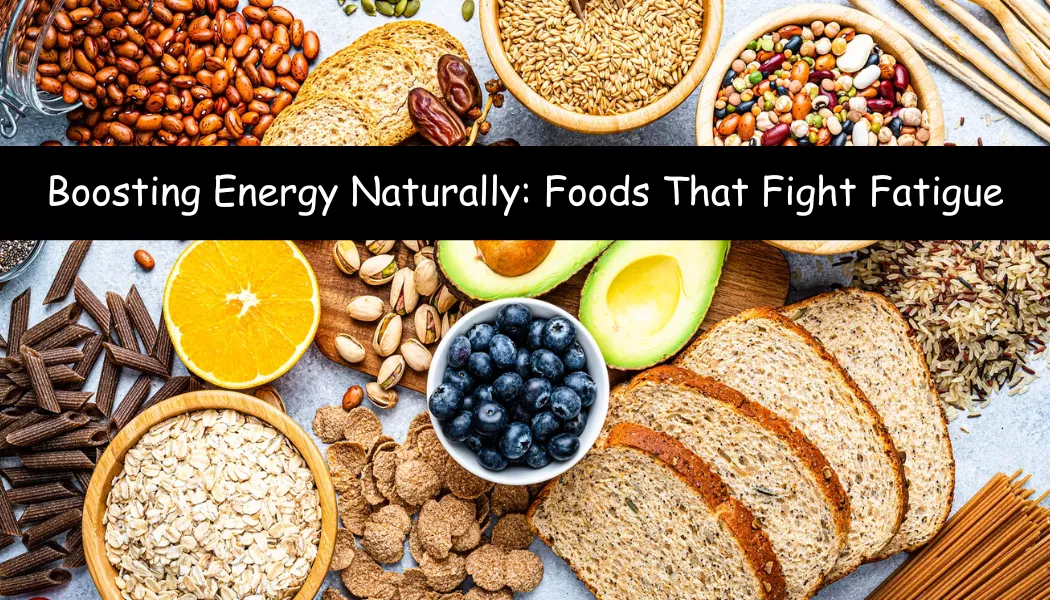Boosting Energy Naturally: Foods That Fight Fatigue
In today’s fast-paced world, fatigue has become a common companion for many of us. Long workdays, busy schedules, and even mental stress can leave us feeling drained and low on energy. While caffeine or energy drinks may provide a temporary boost, they often come with a crash, leaving us more exhausted than before.
In today’s fast-paced world, fatigue has become a common companion for many of us. Long workdays, busy schedules, and even mental stress can leave us feeling drained and low on energy. While caffeine or energy drinks may provide a temporary boost, they often come with a crash, leaving us more exhausted than before. The secret to sustained energy lies in the foods we eat. Certain nutrient-rich foods can help fight fatigue, enhance mental clarity, and keep our energy levels steady throughout the day.
In this article, we explore natural ways to combat fatigue through diet, spotlighting the best foods to fuel your body and mind.
Table of contents
Understanding Fatigue and Energy Levels
Before diving into specific foods, it’s important to understand why we feel fatigued. Fatigue isn’t just about feeling sleepy—it can be a complex interplay of physical, mental, and nutritional factors. Common causes include:
- Nutrient Deficiencies: Low levels of iron, magnesium, B vitamins, or vitamin D can make you feel constantly tired.
- Poor Blood Sugar Control: A diet high in refined sugars causes spikes and crashes in blood glucose levels, leading to fatigue.
- Dehydration: Even mild dehydration can impair physical and mental performance.
- Sleep Disruption: Inadequate or low-quality sleep dramatically reduces energy reserves.
- Stress and Mental Fatigue: Chronic stress can deplete energy and affect hormone balance.
Eating energy-boosting foods helps combat these factors by providing the nutrients your body needs to produce energy efficiently.
Foods That Naturally Boost Energy
1. Whole Grains
Whole grains, such as oatmeal, brown rice, quinoa, and whole-wheat bread, are rich in complex carbohydrates. Unlike simple sugars, complex carbs provide a slow, steady release of glucose into the bloodstream, helping maintain consistent energy levels throughout the day.
Benefits:
- Sustained energy without blood sugar crashes
- High in fiber for digestive health
- Contain B vitamins, which help convert food into energy
Tips for Consumption:
- Start your day with a bowl of oatmeal topped with fruits and nuts.
- Replace white rice with quinoa or brown rice for lunch and dinner.
2. Leafy Green Vegetables
Leafy greens like spinach, kale, and Swiss chard are rich in iron, magnesium, and folate—minerals critical for energy production and red blood cell health. Iron is particularly important because low iron levels can lead to anemia, causing fatigue.
Benefits:
- Boosts oxygen transport in the blood
- Supports muscle function and energy metabolism
- Packed with antioxidants to combat oxidative stress
Tips for Consumption:
- Add fresh spinach to smoothies, omelets, or salads.
- Sauté kale or Swiss chard as a side dish for dinner.
3. Nuts and Seeds
Almonds, walnuts, cashews, chia seeds, and pumpkin seeds are excellent sources of protein, healthy fats, and magnesium—all essential for energy production. They are perfect for quick snacks that provide lasting fuel.
Benefits:
- High in magnesium, supporting energy metabolism
- Contain healthy fats that prevent sudden energy crashes
- Provide protein for muscle repair and sustained stamina
Tips for Consumption:
- Keep a small bag of mixed nuts for mid-morning or afternoon snacks.
- Sprinkle chia or pumpkin seeds over yogurt or salads.
4. Fruits
Fruits such as bananas, oranges, berries, and apples are not only delicious but also natural energy boosters. They provide simple sugars, fiber, and essential vitamins and minerals. Bananas, for example, are rich in potassium and vitamin B6, both of which play a key role in energy production.
Benefits:
- Quick source of natural energy
- Rich in antioxidants to reduce fatigue from oxidative stress
- High water content to support hydration
Tips for Consumption:
- Grab a banana or apple for a quick pre-workout snack.
- Blend berries into smoothies for an energy-rich breakfast.
5. Legumes
Beans, lentils, chickpeas, and peas are powerhouse sources of complex carbs, protein, and iron. They provide long-lasting energy and are excellent for stabilizing blood sugar levels.
Benefits:
- Slow-digesting carbs prevent energy crashes
- High in fiber to support digestive health
- Provide plant-based protein for sustained stamina
Tips for Consumption:
- Add lentils to soups or stews.
- Make chickpea salads or hummus for nutritious snacks.
6. Lean Proteins
Lean meats, fish, poultry, eggs, and tofu are rich in protein and amino acids necessary for repairing tissues and maintaining energy. Fish, particularly fatty fish like salmon and mackerel, also provide omega-3 fatty acids, which support brain health and reduce fatigue.
Benefits:
- Builds and repairs muscles, aiding overall physical energy
- Provides amino acids to prevent mental fatigue
- Supports long-term stamina and metabolism
Tips for Consumption:
- Include eggs or Greek yogurt for breakfast.
- Incorporate grilled chicken or fish into lunch or dinner.
7. Hydrating Foods
Dehydration is a silent energy drainer. Foods with high water content—like cucumbers, watermelon, oranges, and celery—help maintain hydration while providing vitamins and minerals.
Benefits:
- Maintains electrolyte balance and prevents fatigue
- Supports brain function and cognitive energy
- Reduces lethargy caused by mild dehydration
Tips for Consumption:
- Snack on watermelon cubes or cucumber slices.
- Add fresh fruits to water for natural flavor and hydration.
8. Dark Chocolate
Good news for chocolate lovers! Dark chocolate (70% cocoa or higher) contains small amounts of caffeine and theobromine, both of which stimulate alertness. Additionally, it’s rich in antioxidants that improve blood flow and brain function.
Benefits:
- Provides a moderate energy boost
- Enhances mood and cognitive performance
- Rich in antioxidants to reduce fatigue
Tips for Consumption:
- Enjoy a small piece of dark chocolate as an afternoon pick-me-up.
- Use cocoa powder in smoothies for a healthy energy treat.
9. Green Tea
Green tea is rich in L-theanine and a modest amount of caffeine, which together provide a calm, sustained energy boost without the jitters of coffee. The antioxidants in green tea also support overall health and reduce mental fatigue.
Benefits:
- Improves alertness and focus
- Provides antioxidants to combat oxidative stress
- Supports long-term energy and metabolism
Tips for Consumption:
- Replace one cup of coffee with green tea for a balanced energy lift.
- Brew iced green tea with lemon and mint for a refreshing drink.
10. Fermented Foods
Fermented foods like yogurt, kefir, kimchi, and sauerkraut support gut health, which plays a crucial role in energy levels. A healthy gut microbiome improves nutrient absorption, regulates blood sugar, and reduces fatigue.
Benefits:
- Enhances nutrient absorption for sustained energy
- Supports gut-brain axis, reducing mental fatigue
- Provides probiotics for digestive health
Tips for Consumption:
- Add kefir or yogurt to breakfast or smoothies.
- Include a small portion of kimchi or sauerkraut with meals.
habits-that-amplify-energy-from-foods”>Lifestyle Habits That Amplify Energy From Foods
While foods are powerful tools against fatigue, pairing them with lifestyle habits can maximize their benefits. Here are some practical tips:

- Stay Hydrated: Drink water consistently throughout the day, especially alongside high-fiber meals.
- Eat Balanced Meals: Include carbs, protein, and healthy fats in each meal to maintain steady energy.
- Avoid Excess Sugar: Limit refined sugar and processed snacks that cause rapid energy crashes.
- Mind Your Meal Timing: Eating smaller, frequent meals can help prevent fatigue caused by blood sugar dips.
- Incorporate Movement: Light exercise or stretching after meals enhances digestion and energy levels.
- Prioritize Sleep: Energy-boosting foods are most effective when paired with 7–9 hours of quality sleep.
Sample Daily Meal Plan to Fight Fatigue
To put these energy-boosting foods into practice, here’s a sample day that helps sustain energy naturally:
Breakfast:
- Oatmeal topped with banana slices, chia seeds, and almonds
- Green tea
Mid-Morning Snack:
- Apple with a handful of walnuts
Lunch:
- Quinoa salad with chickpeas, spinach, cucumber, and a light olive oil dressing
- Greek yogurt with berries
Afternoon Snack:
- Small piece of dark chocolate
- Herbal tea or water
Dinner:
- Grilled salmon with steamed kale and roasted sweet potatoes
- Fermented side: a small serving of sauerkraut
Evening Snack (if needed):
- A small smoothie with kefir, spinach, and frozen berries
Conclusion: Fueling Energy the Natural Way
Fighting fatigue doesn’t have to rely on caffeine or sugary snacks. By choosing nutrient-dense, energy-boosting foods, you provide your body with the fuel it needs for sustained stamina, mental clarity, and overall vitality. Incorporating whole grains, leafy greens, fruits, nuts, lean proteins, and fermented foods, along with proper hydration and lifestyle habits, can transform how you feel day-to-day.
The next time fatigue hits, instead of reaching for an energy drink, reach for a banana, a handful of nuts, or a bowl of quinoa. With consistent dietary choices and mindful habits, you can naturally energize your body, boost your productivity, and enhance your overall well-being.
Key Takeaways:
- Energy levels are influenced by diet, hydration, sleep, and stress management.
- Whole grains, fruits, vegetables, lean proteins, and nuts are top natural energy boosters.
- Hydrating and fermented foods support sustained energy and mental clarity.
- Small, frequent meals with balanced nutrients prevent energy crashes.
- Pairing the right foods with good lifestyle habits amplifies natural energy production.
The Positivity Collective
The Positivity Collective is a dedicated group of curators and seekers committed to the art of evidence-based optimism. We believe that perspective is a skill, and our mission is to filter through the noise to bring you the most empowering wisdom for a vibrant life. While we are not clinical professionals, we are lifelong students of human growth, devoted to building this sanctuary for the world.
